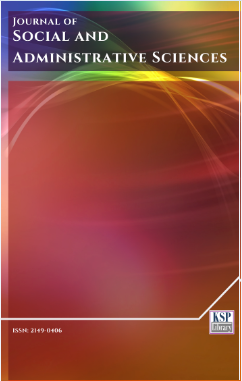Criticizing the critiques of green accounting research
Abstract
Abstract. Green accounting plays a vital role in current sustainability goals. It aims at accounting for the environment and its maintenance and sustainable practices. Implementation of the GA's policies requires an organizational commitment to an environmental impact. Therefore, considering ecological could affect the economy since the gross domestic products are influenced by the country's climate changes. GA has been faced with several challenges and controversial views. The program has, however, not been adopted in the current accounting systems. Besides, environmental accounting continues to be regarded as an alternative issue to states. Consequently, the involvement of accountants in GA is faced with considerable criticism.
Keywords. Green accounting.
JEL. L24, N70, N75.Keywords
References
Ascui, F. (2014). A review of carbon accounting in the social and environmental accounting literature: what can it contribute to the debate? Social and Environmental Accountability Journal, 34(1), 6-28. doi. 10.1080/0969160X.2013.870487
Bailey, I., & Caprotti, F. (2014). The green economy: functional domains and theoretical directions of inquiry. Environment and Planning A, 46(8), 1797-1813. doi. 10.1068/a130102p
Barter, N., & Bebbington, J. (2013). Actor-network theory: a briefing note and possibilities for social and environmental accounting research. Social and Environmental Accountability Journal, 33(1), 33-50. doi. 10.1080/0969160X.2012.743264
Belal, A.R., Cooper, S.M., & Khan, N.A. (2015). Corporate environmental responsibility and accountability: What chance in vulnerable Bangladesh?. Critical Perspectives on Accounting, 33, 44-58. doi. 10.1016/j.cpa.2015.01.005
Bennett, M., & James, P. (2017). The Green bottom line: environmental accounting for management: current practice and future trends. Routledge.
Boehnert, J. (2016). The green economy: Reconceptualizing the natural commons as natural capital. Environmental Communication, 10(4), 395-417. doi. 10.1080/17524032.2015.1018296
Carberry, E.J., Bharati, P., Levy, D.L., & Chaudhury, A. (2017). Social movements as catalysts for corporate social innovation: Environmental activism and the adoption of green information systems. Business & Society, 56, doi. 10.1177/0007650317701674
Chen, Y.S., Lin, C.Y., & Weng, C.S. (2015). The influence of environmental friendliness on green trust: The mediation effects of green satisfaction and green perceived quality. Sustainability, 7(8), 10135-10152. doi. 10.3390/su70810135
Cho, C.H., & Patten, D.M. (2013). Green accounting: Reflections from a CSR and environmental disclosure perspective. Critical Perspectives on Accounting, 24(6), 443-447. doi. 10.1016/j.cpa.2013.04.003
Dana, D.A. (2013). One Green America: Continuities and Discontinuities in Environmental Federalism in the United States. Fordham Environmental Law Review, 24(1), 103-124.
Figge, F., & Hahn, T. (2013). Value drivers of corporate eco-efficiency: Management accounting information for the efficient use of environmental resources. Management Accounting Research, 24(4), 387-400. doi. 10.1016/j.mar.2013.06.009
Kanie, N., Haas, P.M., Andresen, S., Auld, G., Cashore, B., Chasek, P.S., ... & VanDeveer, S.D. (2013). Green pluralism: lessons for improved environmental governance in the 21st century. Environment: Science and Policy for Sustainable Development, 55(5), 14-30. doi. 10.1080/00139157.2013.824339
Karrow, D.D., & Fazio, X. (2015). Curricular Critique of an Environmental Education Policy: Implications for Practice. Brock Education: A Journal of Educational Research and Practice, 24(2), 88-108.
Khan, T. (2013). Sustainability accounting courses, Talloires Declaration and academic research. International Journal of Sustainability in Higher Education, 14(1), 42-55. doi. 10.1108/14676371311288949
Kothari, A., Demaria, F., & Acosta, A. (2014). Buen Vivir, degrowth and ecological Swaraj: Alternatives to sustainable development and the green economy. Development, 57(3-4), 362-375. doi. 10.1057/dev.2015.24
Lodhia, S.K. (2004). Environmental accounting for South Pacific Island nations: A possible mechanism for encouraging sustainable development by the corporate sector. Fijian Studies: A Journal of Contemporary Fiji, 2(1), 114.
Lodhia, S., & Hess, N. (2014). Sustainability accounting and reporting in the mining industry: Current literature and directions for future research. Journal of Cleaner Production, 84, 43-50. doi. 10.1016/j.jclepro.2014.08.094
Loeser, F., Recker, J., Brocke, J. V., Molla, A., & Zarnekow, R. (2017). How IT executives create organizational benefits by translating environmental strategies into Green IS initiatives. Information Systems Journal, 27(4), 503-553. doi. 10.1111/isj.12136
Luck, E., & Ginanti, A. (2013). Online environmental citizenship: Blogs, green marketing and consumer sentiment in the 21st Century. Electronic Green Journal, 1(35), 1-26.
Milne, M.J., & Gray, R. (2013). W(h)ither ecology? The triple bottom line, the global reporting initiative, and corporate sustainability reporting. Journal of Business Ethics, 118(1), 13-29. doi. 10.1007/s10551-012-1543-8
Onkila, T., Joensuu, K., & Koskela, M. (2014). Implications of managerial framing of stakeholders in environmental reports. Social and Environmental Accountability Journal, 34(3), 134-156. doi. 10.1080/0969160X.2013.870488
Parker, L. (2014). Constructing a research field: a reflection on the history of social and environmental accounting. Social and Environmental Accountability Journal, 34(2), 87-92. doi. 10.1080/0969160X.2014.938472
Qian, W., Burritt, R., & Chen, J. (2015). The potential for environmental management accounting development in China. Journal of Accounting & Organizational Change, 11(3), 406-428. doi. 10.1108/JAOC-11-2013-0092
Scerri, A. (2013). Green citizenship and the political critique of injustice. Citizenship Studies, 17(3-4), 293-307. doi. 10.1080/13621025.2012.707002
Schmitz, H. (2015). Green Transformation. The politics of green transformations, 170.
Symons, J., & Karlsson, R. (2015). Green political theory in a climate-changed world: between innovation and restraint. Environmental Politics, 24(2), 173-192. doi. 10.1080/09644016.2015.1008252
Tregidga, H., Kearins, K., & Milne, M. (2013). The politics of knowing “organizational sustainable development”. Organization & Environment, 26(1), 102-129. doi. 10.1177/1086026612474957
Viitanen, J., & Kingston, R. (2014). Smart cities and green growth: outsourcing democratic and environmental resilience to the global technology sector. Environment and Planning A, 46(4), 803-819. doi. 10.1068/a46242
Young, R.F., & McPherson, E.G. (2013). Governing metropolitan green infrastructure in the United States. Landscape and Urban Planning, 109(1), 67-75. doi. 10.1016/j.landurbplan.2012.09.004
DOI: http://dx.doi.org/10.1453/jsas.v5i4.1808
Refbacks
- There are currently no refbacks.
....................................................................................................................................................................................................................................................................................................................................... Journal of Social and Administrative Sciences - J. Adm. Soc. Sci. - JSAS - www.kspjournals.org
ISSN: 2149-0406
Editor: editor-jsas@kspjournals.org Secretarial: secretarial@kspjournals.org Istanbul - Turkey.
Copyright © KSP Library




